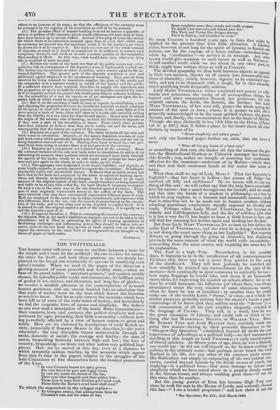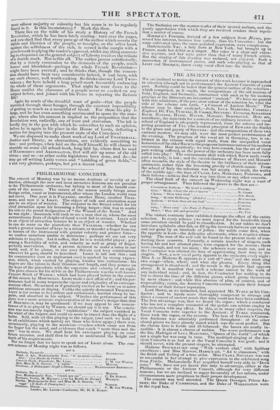THE TWITTERALLS.
THE human mind will never cease to oscillate between a taste for the simple and a taste for the artificial: the one is a love for nature, the other for itself; and both these passions are too deeply im- planted in the breast not continually to operate in modifying each other's results. When we read in the pages of the historian a glowing account of some powerful and wealthy state,—when we hear of its proud nobles, " merchant-princes," and opulent middle classes, its splendid public works and monuments, its brilliant array of genius in art, science, and literature, and long line of glories,— we receive a sensible pleasure in the contemplation of so much human greatness, and are almost hurried into an admission that that state of society must be the best which leaves the historian so much to boast. But let us only turn to the accounts which have been left us of some of the early states of society, and immediately we feel the exquisite Ibree of nature and simplicity. We believe no one ever read a description of the hardy Swiss mountaineers— their manners, laws, and customs, the perfect simplicity and con- tentment for ages pervading their little community—without feel- ing powerfully affected by a view of human nature so great and noble. How arc we charmed by descriptions of early Scotch so- ciety, (especially if ROBERT BURNS is the describer,)—the strict education; the easy discipline thence maintainable through all ranks, domestic or social; the courage and fidelity ; the state of union, bespeaking harmony between high and low ; the love of country, bespeaking—we know not what unless very political hap- piness. How are we moved at this day, even at a distance to which sympathy seldom reaches, by the accounts which appear from time to time in the papers relative to the struggles of the bold Circassians to free themselves from the insolent pretensions of the Czar.
" In vain Circassia boasts her spicy groves,
For ever famed for pure and happy loves; In vain she boasts the fairest of the fair,
Their eyes' blue languish and their golden hair : Those eyes in tears their fruitless grief' must send, Those hairs the Tartar's cruel hand shall rend."
To which the respondent in the eclogue replies-
" Ye Georgian swains, that piteous learn from far Cireassia's ruin and the waste of war,
Some weightier arms than crooks and staffs prepare To shield your harvests and defend your fair : The Turk and Tartar like designs pursue, Fix'd to destroy, and steadfast to undo."
So sung COLLIES a hundred years ago, in lines that might be applied to the present time with little alteration. A hundred years, however, is not long for the spirit of tyranny to flourish and endure, nor for the courage of a brave nation—unbroken mean. while by " civilization "—to survive it in triumph. Any other tyrant would give occasion to such verses as well as Ntcnotts. to tell another truth while we are about it, any other poet,'„ think, might have written them as well as Coraaws.
The divided sympathy we thus hold between objects so opposed in their own natures, throws us of course into innumerable posi- tions of absurdity ; which, however, d yerve to be examined care. fully, and not to be dismissed with a laugh, for in that absurdity much gratifying truth frequently subsists.
Lady MARY TwtrrErtai.r. writes continual new poems on milk- maids and primroses, the vanity of all metropolitan things, her hatred and utter renunciation thereof, her vett:relax for wild original nature, the fields, the flowers, the finches : but Lady MARY TwnTTERAr.L, of her own will, passes the whole spring and summer of the year in town ; where, it is proper to add, she is generally acknowledged to be the most spirited waltzer, the gayest dresser, and, finally, the consummatest flirt in the limits of Mayfair. Though she says distinctly in her 13th Ode to the Daisy, (Poems, vol. iv, p. 237,) that it holds a place in her heart above all other flowers, by reason of its " Sweet simplicity and artless grace,"
and, only one hundred pages further on, adds, that she loves it more " Than all the gay brood of a later sun," or something of that sort, she denies all this the moment she gets into the Horticultural Gardens at Chiswick amongst her fashion- able friends ; nay, makes no scruple of asserting her unalterable affection for the monsters—undreamt of by Nature—which there and then nod their enormous heads at her under the name of tulips.
What then shall we say of Lady MARY? That her hypocrisy is frightful ?—that her heart is hollow—her poems all fudge—her conduct all folly and sinfulness? By no means will we say any thing of this sort : we will rather say that the lady has a reasonable love for nature—but a much stronger one for herself; and we would put this into the hands of a student in philosophy, as a key by which he may explain, in a. humane and reasonable manner, much that is otherwise not to be made out in human conduct without adopting gratuitous conclusions equally opposed to charity and truth. Perhaps when Lady MARY TWITTERALL has become an elderly and half-forgotten lady, and the fire of self-love (for what is it but a very fire?) has begun to burn a little lower in her, you will find her watering her daisies again and tending her finches. But from Lady Many TWITTERALL let us turn to her fitther, the noble Earl of TWITTERA LI., and sec what lie is doing—whether he is not doing the exact same thing as her Ladyship? Not watering flowers or going through the galop at Almack's, but displaying precisely the same amount of what the world calls inconsistency; proceeding from the saute causes, and requiring the same key for its explanation.
The Earl is a high Tory. Nevertheless, in his youthful
days, it happens to be in the recollection of all contemporaneous Etoniaus that there was not a more fiery patriot in the camp of the disaffected. They tell how jealously he watched and how manfully he resisted any encroachment on the part of the masters—how continually in open resistance to authority lie was— how many floggings he would take, and deem it an honourable martyrdom, for expressing his opinion on school affairs: for at one time he would harangue his followers (of whom there was always abundance) under the very window of some obnoxious master, when he knew he was at luncheon ; at another time he would make use of the weekly Latin " theme," or essay, as a vehicle tor similar purposes, probably putting into the master's hands a paper containing—if he knew (but they seldom read the " themes")7a full enumeration of all his own cruelties elegantly couched in the language of CICERO. They tell, in a word, how he was the great champion of Liberty, and could talk or think of no- thing else but HtttMMoDIms, BRUTUS, or Wmiaam TELL. Since Sir ROBERT l'aur. and Lord STANLEY have certainly made one point this season—having by their powerful discourses on the "Glasgow-Boy Question," established beyond all doubt the vast importance of schoolboys as a political body—we feel warranted in dwelling at this length on Lord TWITTERALI:S early manifestation of liberal opinions. At fifteen years of age, then, he was a Radical, would say : he did not call himself so, for he knew nothing of politics in the ordinary sense—had perhaps never heard the word Radical in his life, nor any other of the common party names.
His Radicalism was simply an outpouring of his own natural elm-
it
meter, carried beyond bounds by the fervid excess of youth, bu
implying—in a political form—that same homage to nature and simplicity which we have noted above as a passion deeply rooted in the human breast, and always working good there—it not for this time, then for another. But the young patriot of Eton has become High Tory ever since he took his seat in the House of Lords, and seriously chewed this fact—" I am a landed proprietor ;" and now there is not the * See Spectator, No. 612; 21st March 1840. most odious majority or minority but his name is to be regularly found in it. Is this inconsistency ? Mark this then. There lies on the table of his study a History of the French Revolution, which he has been lately reading : turn over the pages, and you shall find that every passage of the author which asserts the rights and liberties of the people, or inveighs, on the other hand, against the selfishness of the rich, is scored in the margin with a pencil-mark implying the reader's approval, whilst any thing amount- ing to eloquence on the general subject of Liberty receives the tribute of a double mark. Nor is this all. The author proves satisfactorily, that by a timely concession to the demands of the people, much horror and bloodshed—perhaps the whole French Revolution— might have been averted ; and he thinks that, though the conces- sion should have been very considerable indeed, it liad been, with any such chance, well worth making. So thinks also my Lord TWIT- TERALL ; for here behold a long pencil-mark favourably embracing the whole of these arguments. That night he went clown to the House amidst the clamours of a people never so excited on any subject before, and joined with his Peers in rejecting the Reform Bill I
Again he reads of the dreadful want of grain—that the people mutinied through sheer hunger, through the constant impossibility of getting so much as a mouthful of bread. For these his pity is large, and he has even something sentimental to spare for the mar- gin; where also his consent is implied to the proposition that the Revolution was, radically, one of want and starvation. The ink is hardly dry in the pen with which he subscribes to such an opinion, before he is again in his place in the House of Lords, defeating a motion for inquiry into the present state of the Corn-laws!
We are disposed to make short work of my Lord of TWITTERALL. Justice and liberty, as abstractions, are evidently something to him : and perhaps, when laid on the shelf himself, he will chance to stumble on some old school-book, long laid by, where first he read of HAsstomus and ARISTOGITON, that will stir up some of the old virtue ; and so—as other noble legislators have done, and do—he may go off writing Latin verses and " babbling of green fields,"— a not very glorious, perhaps, but yet a decent end.



























 Previous page
Previous page